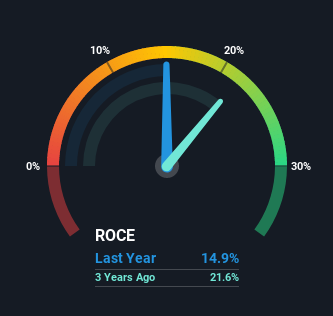- Israel
- /
- Oil and Gas
- /
- TASE:NFTA
Be Wary Of Naphtha Israel Petroleum (TLV:NFTA) And Its Returns On Capital
When it comes to investing, there are some useful financial metrics that can warn us when a business is potentially in trouble. A business that's potentially in decline often shows two trends, a return on capital employed (ROCE) that's declining, and a base of capital employed that's also declining. This indicates to us that the business is not only shrinking the size of its net assets, but its returns are falling as well. Having said that, after a brief look, Naphtha Israel Petroleum (TLV:NFTA) we aren't filled with optimism, but let's investigate further.
Understanding Return On Capital Employed (ROCE)
For those who don't know, ROCE is a measure of a company's yearly pre-tax profit (its return), relative to the capital employed in the business. To calculate this metric for Naphtha Israel Petroleum, this is the formula:
Return on Capital Employed = Earnings Before Interest and Tax (EBIT) ÷ (Total Assets - Current Liabilities)
0.15 = ₪735m ÷ (₪5.6b - ₪642m) (Based on the trailing twelve months to September 2021).
So, Naphtha Israel Petroleum has an ROCE of 15%. In absolute terms, that's a satisfactory return, but compared to the Oil and Gas industry average of 9.1% it's much better.
Check out our latest analysis for Naphtha Israel Petroleum

While the past is not representative of the future, it can be helpful to know how a company has performed historically, which is why we have this chart above. If you're interested in investigating Naphtha Israel Petroleum's past further, check out this free graph of past earnings, revenue and cash flow.
What Does the ROCE Trend For Naphtha Israel Petroleum Tell Us?
The trend of returns that Naphtha Israel Petroleum is generating are raising some concerns. To be more specific, today's ROCE was 19% five years ago but has since fallen to 15%. What's equally concerning is that the amount of capital deployed in the business has shrunk by 26% over that same period. The combination of lower ROCE and less capital employed can indicate that a business is likely to be facing some competitive headwinds or seeing an erosion to its moat. Typically businesses that exhibit these characteristics aren't the ones that tend to multiply over the long term, because statistically speaking, they've already gone through the growth phase of their life cycle.
In Conclusion...
In summary, it's unfortunate that Naphtha Israel Petroleum is shrinking its capital base and also generating lower returns. In spite of that, the stock has delivered a 31% return to shareholders who held over the last five years. Regardless, we don't like the trends as they are and if they persist, we think you might find better investments elsewhere.
If you want to continue researching Naphtha Israel Petroleum, you might be interested to know about the 1 warning sign that our analysis has discovered.
While Naphtha Israel Petroleum isn't earning the highest return, check out this free list of companies that are earning high returns on equity with solid balance sheets.
Valuation is complex, but we're here to simplify it.
Discover if Naphtha Israel Petroleum might be undervalued or overvalued with our detailed analysis, featuring fair value estimates, potential risks, dividends, insider trades, and its financial condition.
Access Free AnalysisHave feedback on this article? Concerned about the content? Get in touch with us directly. Alternatively, email editorial-team (at) simplywallst.com.
This article by Simply Wall St is general in nature. We provide commentary based on historical data and analyst forecasts only using an unbiased methodology and our articles are not intended to be financial advice. It does not constitute a recommendation to buy or sell any stock, and does not take account of your objectives, or your financial situation. We aim to bring you long-term focused analysis driven by fundamental data. Note that our analysis may not factor in the latest price-sensitive company announcements or qualitative material. Simply Wall St has no position in any stocks mentioned.
About TASE:NFTA
Naphtha Israel Petroleum
Engages in the exploration, development, production, and sale of oil and gas in Israel and the United States.
Excellent balance sheet with slight risk.
Market Insights
Community Narratives



